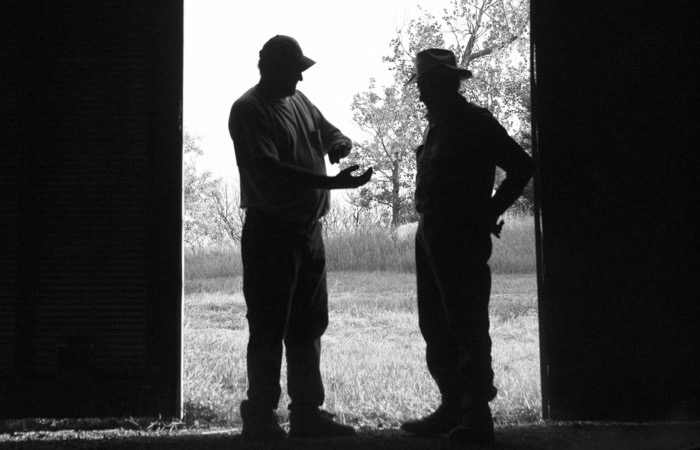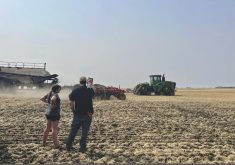
When it comes time to put succession planning on your personal agenda, there are only a couple of ways for it to go, says Delores Moskal. There are the parents who are open to talking succession with the next generation. And then there are parents reluctant to even broach the subject with the kids.
So it raises the questions: If you’re on a farm with the second type of parent, how can you kick-start the process? What can you do to get yourself ready? And, perhaps just as importantly, what should you do if nothing works, and Mom and Dad still won’t talk?
Moskal grew up on a farm near Ituna, in central Saskatchewan, and she still lives in the same area, on her husband’s family farm. She has also spent over 30 years working for the Cornerstone Credit Union in rural Saskatchewan, filling roles such as lender and investment specialist. Today she’s a self-employed certified financial planner and registered retirement consultant, and much of her work focuses on helping farm families with succession planning.
Read Also

Lessons from the past: How Canada can reverse its shrinking share of the global food market
A historic look back at how Canada has positively dealt with trade issues — and how those lessons can inform future moves.
- Read more: Get off to a better start with farm succession
- Read more: Never too young to talk about farm succession
Moskal’s voice is calm, almost musical, and she leaves the impression that nothing fazes her.
Every family is different, she says, so the tools that work in one situation might not work in another. But she does like to start by going through Elaine Froese’s key challenges audit sheet. That worksheet will help each person identify the challenges they see in the succession process, she says.
“And it’s going to be different for everyone,” she repeats. In fact, Moskal says the audit sheet can be an eye-opener, with one person in the family seeing challenges where another sees a green light.
But there’s another first step too. Moskal finds that some parents are afraid to be bold and open about their situations with their kids, so the first challenge is helping them get past that fear so they can at least start the conversation.
The root of parental reluctance varies. Sometimes it’s because they aren’t impressed with their kid’s work ethic, Moskal says. She says they want to ask the kids, “How far would you get if you were working for an employer who wasn’t your parent if you showed up to work at 10 o’clock?”
If you’re a kid on that farm, that’s a real question to deal with (see ‘Get your own ducks in a row’ further down).
Problems can also stem from a combination of assumptions and entitlement. Moskal has heard stories of young farmers who had rental agreements with parents, but didn’t pay them out.
“And then when they’re asked, they go: ‘Well, it’s going to be ours anyways.’ But in the interim, Mom and Dad still need an income from there. They shouldn’t be drawing on their savings,” says Moskal.
The kids might assume their parents have always been good savers, but they really don’t know, she adds.
Other financial issues might be at the root of parents’ hesitation to start transferring the farm if both generations are going to be on the farm, Moskal says.
“How much does the farm need to pay you to support your lifestyle? And how much are you willing to give up in your current lifestyle so that the farm can still be viable?” Often the farm is the parents’ pension plan, and they’ll need to figure out how to get their cash out, she adds.
One thing that never works is bullying, Moskal says. The warning signs aren’t always clear, at least not at first, but Moskal thinks it often comes down to a lack of respect.
If a parent is controlling, it can be very hard for the successor to pull the plug, especially as they invest more years in the family farm. “And then it gets to the point where you’re 60 and your parents are 80 and you still don’t own the land in your own name.”
Bullying can come from the younger generation, too, especially if there’s a power imbalance. “In some situations the parents can only farm if their kids help them because it’s a labour issue.”
People can get stuck, and they might sever the relationship in the end, so it might be best to take a step back and think about what’s best for both parties.
Where do the issues lie?
Often family relationships and business are blended together, and it can be hard to see where the issue lies.
The farm business must be viable, and must provide income to sustain the family’s lifestyle, Moskal says. Or sometimes, family members who aren’t farming want a say in business decisions, but farm business decisions should be between the people farming, she adds.
However, family issues need to be acknowledged, too, Moskal says. How do the non-farming siblings fit in? Will they be entitled to anything as part of their parents’ estate? Who else has a stake in the farm?
Finally, there are also ownership issues. Young farmers seeking to open the conversation might want to think about whether farm transfer needs to start with ownership. Perhaps they can start by taking on more management to prove themselves, Moskal says. “And eventually there will be that transfer of ownership. It happens in stages.”
Often relationships break down under the weight of too many assumptions and not enough communication. Moskal suggests talking while relationships are good, before farm families run into the tough situations, such as an unexpected death. “It just gets ugly. So to avoid the ugly, you just need to say what would we do if this happened?”
For those young farmers who don’t feel they can start the conversation with their parents, Moskal suggests looking for people who can mentor them through that first step. That might be as simple as turning to friends who’ve been through it and asking what worked for them.
Bringing in a third-party to facilitate the meeting can also help, says Moskal. A third party can help take the emotion out of the discussion, and ensure everyone has a chance to voice their concerns. Somehow, a bridge must be built.
Get your own ducks in a row
As a financial planner, Delores Moskal often feels like a GPS system, pointing her clients to professionals to help them with succession planning. But before farmers can assemble their dream team of advisers, they need to figure out their own objectives, she says.
Once young farmers have goals, aspirations and dreams to work towards, Moskal advises saving some cash to buy into the farm. She also says young farmers need to get a good handle on what it costs to fund their lifestyles and responsibilities, such as family vacations and their children’s educations.
Tracking personal expenses isn’t an enjoyable task for many, but it helps families figure out how much they need from the farm and any off-farm jobs. Quite often the spouse manages the family’s personal finances (and often supports the family through an off-farm job), but Moskal says all the responsibility shouldn’t fall on one person.
However, the reality is that the farm business can suck up a lot of time, and it’s not good for people to spread themselves too thin. Moskal suggests putting the family expenses on automatic as much as possible by doing things like tracking spending through online banking systems.
Moskal has surveyed clients about barriers to financial planning, and those who procrastinate say they just don’t have time. Time is a friend to anyone in the midst of financial planning and farm succession, but Moskal points out it’s not a given. She worries about what would happen if the farming spouse died prematurely. Would the other spouse have enough money to either buy out the in-laws or walk away from the farm?
It’s a tough thing to even consider, but Moskal says farmers should pretend they are going to die tomorrow, and then work through what their families would do. It’s a good idea to collaborate with the people you need to while you can, in case of an unexpected death or soured relationship.
Succession planning isn’t easy, but Moskal has seen plenty of success stories over the years. She mentions a young couple who recently moved onto the farm. The parents built a new house a ways down the road, but they’re still involved in the farm. The succession plan has worked out really well, she says.
As for young farmers just starting out, Moskal says there are many roads to transitioning the farm.
“We just have to find out what’s the best route for you.”
















